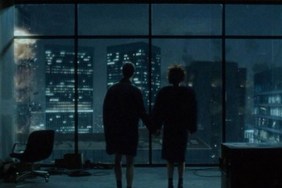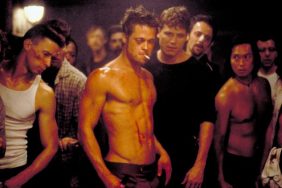When David Fincher’s Fight Club was released in theaters back in 1999, it was something of a flop. Critics were mixed on the stylistically daring and thematically unique adaptation of a famously unfilmable Chuck Palahniuk novel, and audiences were only mid-sized at best. Fight Club is, however, one of those ’90s films (like The Shawshank Redemption or Austin Powers) that found new life on home video, and quickly grew into one of the most celebrated films of its generation. It currently holds the #10 spot on IMDb’s Top 250, is often quoted by its myriad fans, and occasionally runs at late-night screenings at local movie houses. One could even say that it was Fight Club that turned David Fincher from a struggling genre player into a Hollywood darling.
Check Out: Trolling #47: ‘Dungeons & Dragons’ RULES!
Here at Trolling, of course, when we hear words like “celebrated” and “beloved,” we instantly bring out the sledgehammers. Popularity and adoration make us suspicious, and anything that is particularly loved will feel the wrath of our deep, unforgiving critical scrutiny. We dig through the things you love, looking for things to hate. And, as it turns out, there’s plenty to hate about Fight Club. We’re about to break the first two rules, friends, and declare the following: Fight Club SUCKS. Let’s delve a bit:
Fight Club is bracing, thoughtful, and it looks amazing. It also gets points for telling a stirring original story in a daring way, and more points for including some actual philosophy. But, at the end of the day, Fight Club is chest-thumping claptrap for immature men who think violence is cathartic. It’s also sloppily constructed, too long, and hugely unfocused. It has its fans, but its fans seem to be constantly misinterpreting it.
Until next week, let the hate mail flow.
Witney Seibold is a commentator at Nerdist, a contributor to the CraveOnline Film Channel, and co-host of The B-Movies Podcast. You can read his weekly Trolling articles here on Crave, and follow him on “Twitter” at @WitneySeibold, where he is slowly losing his mind.
Fight Club SUCKS!
-
It's Too “Macho”

Fight Club is, at least partly, a film about masculinity, and how modern men – still vaguely driven by an ancient undefined caveman impulse – feel emasculated by the new wave of “sensitive guys” that has leaked into the culture in 1990s America. They act out their impulses by beating each other. The masculine posturing in this movie, however, is just as empty and as risible as the beefcake photos the characters scoff at. Is what the men doing really masculine, or is it just another version of dumb, pathetic “macho” posing? I'd say the latter.
-
It Celebrates What it Claims to Decry

Fight Club is one of the most misinterpreted films of all time. Like people who watch Sid & Nancy to increase their own appetite for heroin, fans often look to Tyler Durden as a model of freedom. And it's easy to see why. Tyler Durden is cool. Indeed, all of Fight Club is slick, stylized, and really cool-looking. That style, however, seems to mute, dampen, and completely snuff out the screenplay's message: THIS STUFF IS BAD STUFF. Tyler Durden is an evil force, the men are terrorists, and the desperate grab for masculinity is a futile one. This is a film about how tough-guy masculinity has always been something of a churlish myth, but the film presents it as a cool and fun thing. It's the funnest ride to oblivion ever made.
-
It's Choppy

Fight Club has three acts that practically stand independently of one another, and don't really flow thematically or logically. The first act is about an insomniac who must attend random support group meetings to sleep. The second act is about living in squalor and regaining your manhood by punching other guys in the face. The third act features a famous twist that is, when considered deeply, included for mere trickery. We have three unconnected movies here. It would be nice if we have more grace.
-
No Broken Hands?

When you punch someone in the face, you hurt their face, but you also hurt your hand. A single, well-placed closed-fist punch to the jaw can crack one of your knuckle bones. The men in Fight Club are often seen wandering around with bloodies noses, bruised faces, and black eyes. Fair enough. Not one of them ever says “I can't fight tonight because my hands are both sprained.” The fights are not real, hefty fights about actual men fighting, but the usual movie fights we see in usual action movies, just with slightly more blood than usual.
-
It's Immature

Tyler Durden's philosophy is a distressing mish-mash of old-world nihilism that any and all teenagers doodle in the margins of their notebooks. Tyler manages to attract a wide swath of white collar men to join his ranks and become a terrorist group. Are none of the men he talked to – none of them – familiar with fascism? With Nietzsche and Camus? Surely some of the guys must have stopped at some point and said “Isn't this Tyler guy just repeating snippets of older books and creating a fascist terrorist regime? Isn't his philosophy behind all of this kind of flimsy?” Surely some of Tyler's “followers” were college-educated, and had come to the realization that his adolescent preaching was, well, adolescent.
-
It Hates Women

There is one (1) notable female role in this film full of men, and she is a suicidal, drug-addicted, lying sex maniac. Not that suicidal drug-addicted lying sex maniacs can't be perfectly decent human beings, but Marla strikes me as a weird sort of male sex fantasy more than a fully-realized character. She is someone that you can wow in bed, be filthy with, and then push out of your life whenever it's convenient. This is a film that is so obsessed with masculinity that its female presence is marginalized. Some have said that Fight Club is misogynistic. There might be something to that.








